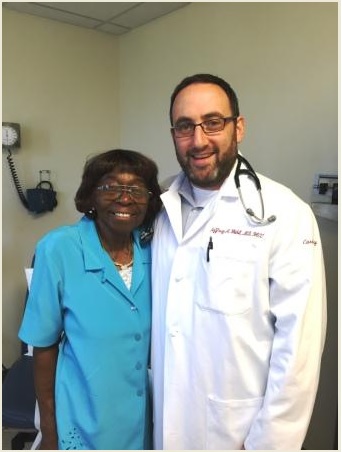New heart failure solution means fewer hospital visits for Lucille

Ask her a year ago? It would have been a different story.
McGee’s active lifestyle was put on hold when persistent shortness of breath caused her to be admitted to the hospital seven times in 2014.
“I didn’t feel any pain, but I couldn’t breathe,” she recalls. “They’d put me in the hospital, then they’d send me home. After being home for two days, the ambulance would be up at my house again.”
For months, the cycle continued. McGee was living with heart failure, her shortness of breath due to fluid in her lungs as a result of the disease. Each time she was admitted to the hospital, doctors drained her lungs of excess fluid, but she returned each time they filled up again.
In late 2014, Dr. Wuhl and the cardiology team at Lankenau Medical Center approached McGee with a treatment option that would offer her relief from her shortness of breath and the opportunity to reduce future hospital visits.
“They came to me and he said, ‘We’ve got a new device we can try’,” says McGee. “At that point, I was willing to try anything.”
That device was the CardioMEMS Heart Failure System, the first new miniature wireless monitoring sensor approved by the FDA in May 2014 to monitor heart failure symptoms and reduce hospital readmissions. In January, Lankenau became the first hospital in the Delaware Valley to offer the device. And McGee’s health issues made her an ideal candidate to become the first recipient.
“This technology is best suited for patients who have been hospitalized at least two times as a result of heart failure symptoms, and whose symptoms worsen with less than ordinary activity. Ms. McGee was comfortable at rest, but would experience shortness of breath and, ultimately, hospitalization, when she was moving around the house or in her garden,” explains Christopher Droogan, DO, cardiologist and Medical Director of the Advanced Heart Failure Program at Lankenau Medical Center and Lankenau Heart Institute. “Despite her age, her health, and her activity made her a perfect fit for the CardioMEMS device.”
Dr. Wuhl, who referred McGee to Dr. Droogan, agreed.
"Ms. McGee lives an extremely active life, and enjoyed her independence. Her shortness of breath had become debilitating to her, and the CardioMEMS device had the potential to offer her relief and an improved quality of life.”
And so, in January 2015, McGee became the first patient at Lankenau to receive the Cardio MEMS Heart Failure System implant. During a minimally-invasive procedure, interventional cardiologist Eric Gnall, DO, implanted a small sensor into McGee’s pulmonary artery. Each morning, through wireless monitoring, the sensor transmits daily readings of McGee’s pressure in her lung arteries to her care team at Lankenau.
If her readings are too high, indicating worsening heart failure, she receives a prompt phone call with instructions to adjust her heart failure medications like her water pills, lower salt in her diet, and keep in touch with her doctor if her symptoms worse. In addition, if her pressures are too low, a call is made instructing her to cut back on her medication before she gets too dehydrated.
Almost a year after the procedure, McGee has already noticed a difference.
“I’ve had a couple of calls telling me to adjust my medicine and take it easy, but not many,” she says. “I know how to stop now, whereas I didn’t know before. I learned how to take it easy.”
Part of taking it easy is the help she gets from her beloved neighbor and friend, Kenneth Watson. Though McGee has herself to thank for a healthy life, she credits Watson for helping her through the past year.
“I wouldn’t be anywhere if it wasn’t for him,” she says of Watson, who checks on her every morning and has accompanied her to hospital and physician offices.
She also credits the work of her doctors, Dr. Wuhl, Dr. Droogan, and Dr. Gnall at Lankenau for recognizing that she was a candidate and helping her find a solution for the shortness of breath and repeated hospital visits that had been her life for so long.
McGee continues with daily transmissions of her CardioMEMS pressures and follow up visits with Dr. Wuhl to manage her heart failure symptoms but, as both McGee and Dr. Wuhl can attest, she is looking—and feeling—good.
“I’m happy they considered me, and that I finally don’t have to worry about having trouble breathing anymore,” she says. “I feel good.”
 Content you want, delivered to your inbox
Content you want, delivered to your inbox
Want to get the latest health and wellness articles delivered right to your inbox?
Subscribe to the Well Ahead Newsletter.
